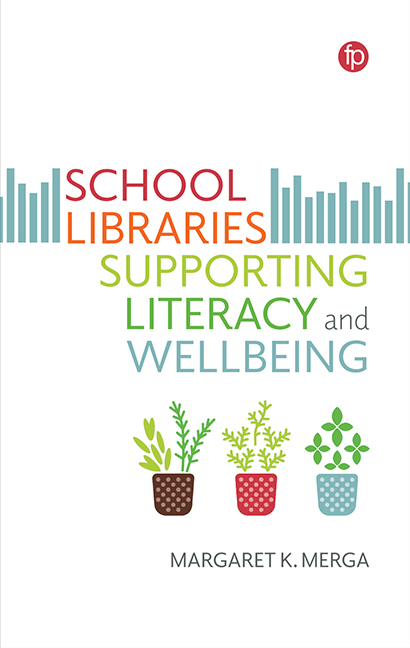Book contents
- Frontmatter
- Contents
- List of Tables
- Acknowledgements
- Abbreviations
- Introduction
- 1 What Do School Library Professionals Contribute to Student Learning and Support? A Focus on Australia and the UK
- 2 School Libraries and Reading Engagement for Literacy
- 3 Librarians Supporting Struggling Literacy Learners Beyond the Early Years
- 4 School Libraries and Reading Engagement for Student Wellbeing
- 5 School Libraries, Health Resourcing and Information Literacy
- 6 Librarians Creating Environments for Reading and Wellbeing
- 7 Challenges to Visibility and Advocacy for School Libraries and Staff
- Conclusions and Directions for Future Research
- Appendix 1 Background and Methods of My Research Projects
- Appendix 2 A Place to Get Away from It All: Five Ways School Libraries Support Student Wellbeing
- Index
- Frontmatter
- Contents
- List of Tables
- Acknowledgements
- Abbreviations
- Introduction
- 1 What Do School Library Professionals Contribute to Student Learning and Support? A Focus on Australia and the UK
- 2 School Libraries and Reading Engagement for Literacy
- 3 Librarians Supporting Struggling Literacy Learners Beyond the Early Years
- 4 School Libraries and Reading Engagement for Student Wellbeing
- 5 School Libraries, Health Resourcing and Information Literacy
- 6 Librarians Creating Environments for Reading and Wellbeing
- 7 Challenges to Visibility and Advocacy for School Libraries and Staff
- Conclusions and Directions for Future Research
- Appendix 1 Background and Methods of My Research Projects
- Appendix 2 A Place to Get Away from It All: Five Ways School Libraries Support Student Wellbeing
- Index
Summary
When you walk into a school library, you immediately feel that you are entering a special space with affordances that are unique to it. You might admire student art on the walls; note a cluster of students sprawled in beanbags, lost in a book; see industrious students constructing art in a makerspace, quietly laughing as part of it collapses unintentionally; or observe a group of students voraciously seeking and consuming new knowledge using information literacy skills also taught within that space. The possibilities are vast; however, what you are less likely to view are uncomfortable students wearing the pinched look of anxiety that you see on the faces of students in classrooms who are struggling and feeling that they are falling short in academic performance, social connection or other areas of concern in their young lives. The library sits as a potential sanctuary where literacy and other skills can be fostered in a supportive space.
Personally, the school library was a refuge for me as a very shy student in primary school. I have fond memories of spending many hours during recess and lunch reading books and drawing pictures of horses with my friend (singular). I can't claim to have developed my horse-drawing talent over that time (sadly, even as an adult my horse pictures still look like mice), but I gained in many other areas thanks to my school library. I had a safe place where I could be an awkward introvert away from the gaze of my more extroverted peers, and I had the chance to enjoy shared quiet companionship, which made school life much more bearable. I also had access to my favourite books, with so many worlds to explore.
Contemporary school libraries are a place for everybody, but they need to be resourced and supported to be able to act as a refuge for students. They are exciting and dynamic environments that are constantly changing in order to be responsive to evolving demands within and beyond the school com - munity, often catering to increasingly diverse client needs with limited resources. For example, the most recent Softlink survey in the UK found that only 46% of respondents felt that their library had adequate resourcing in relation to staffing and budget (Softlink, 2021).
- Type
- Chapter
- Information
- School Libraries Supporting Literacy and Wellbeing , pp. xvii - xxviPublisher: FacetPrint publication year: 2022



